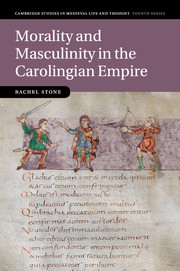Book contents
- Frontmatter
- Contents
- Illustrations
- Acknowledgements
- A note on translation
- Abbreviations
- The Carolingian empire
- Genealogy of Carolingian rulers
- Chapter 1 Introduction
- Chapter 2 Moral texts and lay audiences
- Chapter 3 Warfare
- Chapter 4 Imagining power
- Chapter 5 Central power
- Chapter 6 Personal power
- Chapter 7 Power and wealth
- Chapter 8 Marriage
- Chapter 9 Sex
- Chapter 10 Men and morality
- Bibliography
- Index
Chapter 9 - Sex
Published online by Cambridge University Press: 05 November 2011
- Frontmatter
- Contents
- Illustrations
- Acknowledgements
- A note on translation
- Abbreviations
- The Carolingian empire
- Genealogy of Carolingian rulers
- Chapter 1 Introduction
- Chapter 2 Moral texts and lay audiences
- Chapter 3 Warfare
- Chapter 4 Imagining power
- Chapter 5 Central power
- Chapter 6 Personal power
- Chapter 7 Power and wealth
- Chapter 8 Marriage
- Chapter 9 Sex
- Chapter 10 Men and morality
- Bibliography
- Index
Summary
Although some Christian norms of sexual behaviour were new, others drew extensively on both classical and Jewish traditions. Jesus in the Gospels said relatively little about personal sexual behaviour. New Testament sexual ethics were developed further in the epistles of Paul and his followers, and a strict code of sexual discipline soon became a key way of showing Christian communities as a ‘holy people’. By the early fourth century a clear contrast between a militantly ascetic view of the church, stressing celibacy, and a society of settled Christian households had developed. In the West, the prevailing view valued virginity and continence over marriage, and fourth- and fifth-century patristic writing about sexuality was almost exclusively negative. St Augustine, even as he defended marriage as good, developed a vision of sexuality as an enduring psychological drive, not easily tamed by society. Yet as Julia Smith comments on the intellectual resources available to Carolingian writers on gender and sexual behaviour: ‘that heritage was vast, and neither coherent nor consistent’.
Studying sexuality
While there is a long tradition of historical research on marriage, the history of sexual practices and ideas is a relatively new scholarly field, developing only in the 1970s. The initial interest in researching medieval sexuality had several different starting points. One was church history, in which a more academic approach was brought to tracing the western church’s changing attitudes to sexual behaviour. Another was the new fields of women’s history and gay history, with historians exploring medieval attitudes to the sexuality of these groups. More recently still, scholars of the Middle Ages have begun applying theories on the social construction of sexuality first developed in studies of the modern and classical worlds.
- Type
- Chapter
- Information
- Morality and Masculinity in the Carolingian Empire , pp. 279 - 310Publisher: Cambridge University PressPrint publication year: 2011



